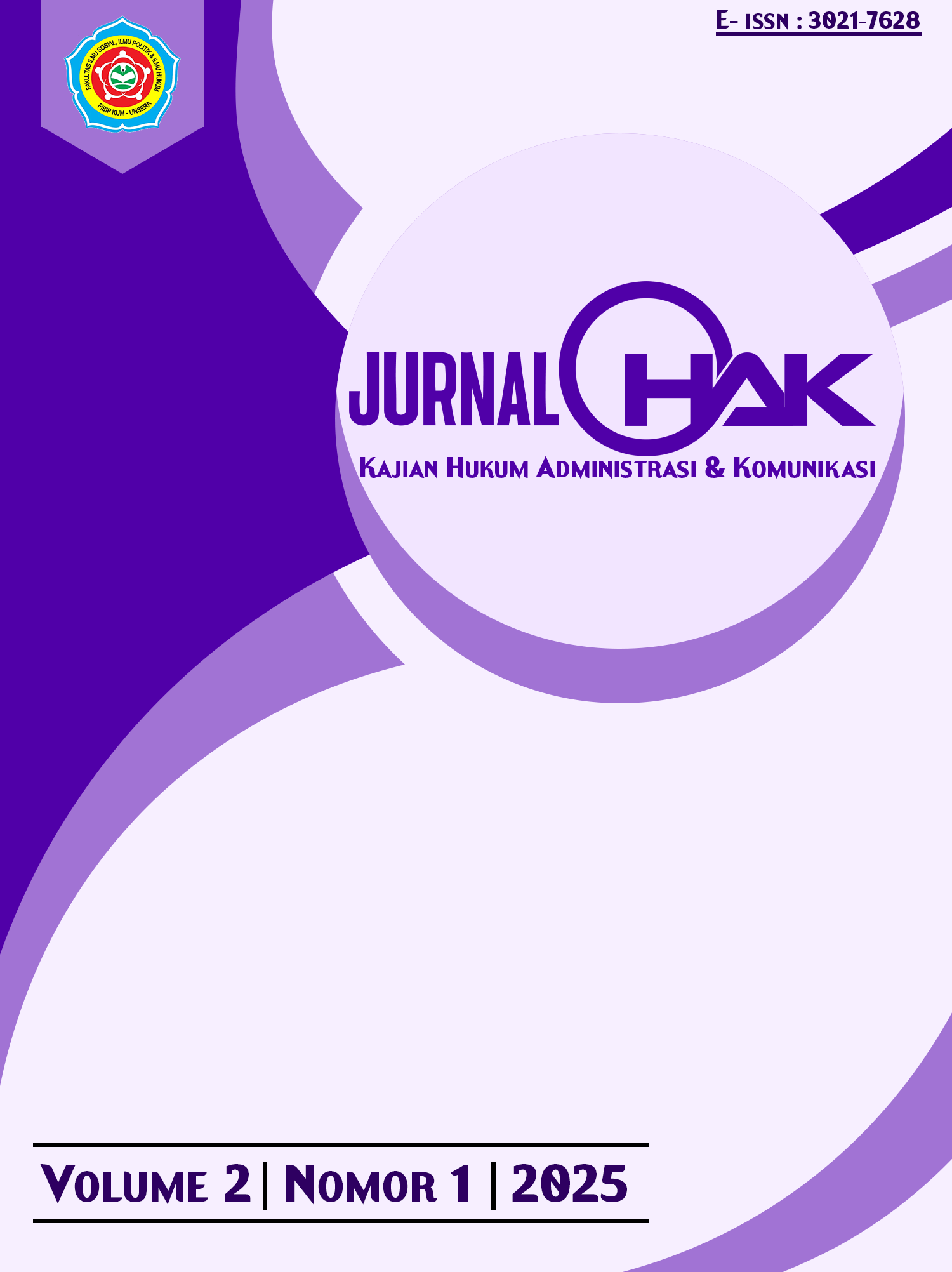The Interest UNICEF on Involvement of K-Pop Artists in Humanitarian Campaigns
DOI:
https://doi.org/10.30656/jhak.v2.i1.10522Abstract
This paper analyzes why UNICEF collaborates with K-Pop companies in conducting campaigns. Before the Korean Wave phenomenon hit the global stage, UNICEF had involved several non-state actors, the majority of whom were artists, as international or regional ambassadors. Only when K-pop has global fans is UNICEF interested in attracting several K-pop artists, such as BTS, Super Junior, and Everglow. This is one of the reasons UNICEF chose K-pop idols as ambassadors. Furthermore, K-pop fans have high loyalty and fanaticism toward their idols. They unconsciously make their idol's behavior, habits, and mindset an identity norm. They will also be aggressive towards outside groups who insult their idols. Seeing such characteristics benefits UNICEF because when K-pop artists become UNICEF ambassadors and spread human values, their fans will follow their idols and help the struggles of the K-pop artists they follow. Finally, there is a shared vision between K-pop idols and UNICEF. Having a shared vision will make it easier for both parties to plan actions and run campaigns.
References
Journal
Capistrano, E. P. (2019). Understanding Filipino Korean Pop Music Fans. Asian Journal of Sosial Science, 59 - 87. https://www.jstor.org/stable/26668749
Capistrano, E. P., Ryu, J., & Lin, H.-C. (2018). Non-Korean consmers' preferences on Korean popular music : A two-country Study. International Journal of Market Research, 1-19. https://doi.org/10.1177/1470785318796951
Jang, W., & Song, J. E. (2017). The Influence of K-Pop Fandom on Increasing Cultural Contact. Korean Regional Sociology, 29 - 56. https://barnettcenter.osu.edu/sites/default/files/2019-08/the_influences_of_k-pop_fandom.pdf
Kim, S. M., & Park, M. J. (2020). Evaluation of Cross-National Global Market Segmentation and Strategy : The Case of Korean Wave for ASEAN Countries. Asia Pasific Management Review, 1 - 9. https://doi.org/10.1016/j.apmrv.2020.04.001
Leung, S. (2012). Catching the K-Pop Wave : Globality in the Production, Distribution and Concumption of South Korean Popular Music. Senior Capstone Project, 1 - 85. https://citeseerx.ist.psu.edu/document?repid=rep1&type=pdf&doi=c320b5b5a0b407db2483e960896014dc99adc4e7
Marinescu, V., & Balica, E. (2013). Korean Cultural Products in Eastern Europe : A Case Study of the K-Pop Impact in Romania. Region : Regional Studies of Russia Eastern Europe and Central Asia, 113 - 135. https://www.jstor.org/stable/43737650
Otmazgin, N. K. (2008). Contesting Soft Power : Japanese Popular Culture in East and Southeast Asia. International Relations of the Asia Pasific Vol 8, 73 - 101. https://doi.org/10.1093/irap/lcm009
Otmazgin, N., & Lyan, I. (2014). Hallyu across the Desert : Kpop Fandom in Israel and Palestine. Cross Currents : East Asian History and Culture Review, 32 - 55. https://doi.org/10.1353/ach.2014.0008
Romano, A. (2018, February 26). How K-pop became a global phenomenon. Vox: https://www.vox.com/culture/2018/2/16/16915672/what-is-kpop-history-explained
Sari, R. F. (2020). Pendekatan Customer Relationship Management (CRM) Big Hit Entertainment pada Global Fandom. Jurnal Penelitian Pers dan Komunikasi Pembangunan, 85-100. 10.46426/jp2kp.v24i2.140
Seong Cheol Choi, X. V. (2014). South Korean Culture Goes Latin America : Social Network Analysis of K-Pop Tweets in Mexico. International Journal of Contents, 36 - 42. https://doi.org/10.5392/IJoC.2014.10.1.036
Shin, W. (2016). The Succes of K-Pop How Big and Why so Fast. Asian Journal of Social Science, 1-23. https://www.jstor.org/stable/44508094
So Yeon Park, B. K. (2021). Armed in ARMY: A Case Study of How BTS Fans Successfully Collaborated to #MatchAMillion for Black Lives Matter . CHI Conference on Human Factors in Computing Systems (CHI ’21), 1-14. https://doi.org/10.1145/3411764.3445353
Sohn, Y. (2011). Attracting Neighbors : Soft Power Competition in East Asia. The Korean Journal of Plicy Studies, Vol 26 No 1, 77-96. https://hdl.handle.net/10371/75562
Swan, A. L. (2018). Transnational Identities and Feeling in Fandom : Place and Embodiment in K-Pop Fan Reaction Videos. Comunication Culture and Critique, 1-18. https://doi.org/10.1093/ccc/tcy026
Zhang, Q., & Negus, K. (2020). East Asian pop music idol production and the emergence of data fandom in China. International Journal of Cultural Studies, 1 – 19. https://doi.org/10.1177/1367877920904064
Website
Angelina, T. (2021, December 24). BTS Contributes 0.5 Percent To South Korea's Economy. VOI: https://voi.id/en/lifestyle/117157/bts-contributes-05-percent-to-south-koreas-economy
Ayoe, Y. S. (2019, November 09). Bikin Speecless, 5 Kegilaan Ekstrem ELF untuk Super Junior. matamata.com: https://www.matamata.com/kpop/2019/11/09/190000/bikin-speechless-5-kegilaan-ekstrem-elf-untuk-super-junior
Culture and the Arts : Hallyu (Korean Wave). Korea.net: https://www.korea.net/AboutKorea/Culture-and-the-Arts/Hallyu#:~:text=From%20the%20mid%2D1990s%20to,such%20as%20China%20and%20Japan.
Donyayaya. (2021, August 26). EVERGLOW collaborates with UNICEF on Promise Campaign. ENVI: https://www.envimedia.co/everglow-collaborates-with-unicef-on-promise-campaign/
Haro, J. (2021, October 5). BTS and UNICEF celebrate 4 years of the 'Love Myself' campaign to promote child self-esteem. UN News: https://news.un.org/en/story/2021/10/1102252#:~:text=Earlier%20this%20year%2C%20BTS%20and,serve%20to%20invigorate%20everyone's%20lives.
Herman, T. (2022, February 10). Which K-pop bands were the most tweeted about in 2021? And which countries’ K-pop fans tweeted the most? South China Morning Post: https://www.scmp.com/lifestyle/k-pop/news/article/3166529/which-k-pop-bands-were-most-tweeted-about-2021-and-which?module=perpetual_scroll_0&pgtype=article&campaign=3166529
Hodoyan-Gastelum, A. (2019, March 14). 10 Years Ago, Super Junior's 'Sorry, Sorry' Changed Kpop Forever. MTV News: https://www.mtv.com/news/3116871/super-junior-sorry-sorry-10-years-k-pop/#:~:text=Simple%2C%E2%80%9D%20Super%20Junior%20dominated%20the,also%20won%20the%20fandom%20award.
How did K-Pop conquer the world ? (2019, May 29). BBC: https://www.bbc.com/culture/article/20190529-how-did-k-pop-conquer-the-world
Koreaboo. (2019, August 23). This World Map Shows Which K-Pop Groups Are The Most Popular In Each Country. Koreaboo: https://www.koreaboo.com/news/world-map-shows-kpop-groups-popular-country/
KoreaDispatch. (2021, December 10). NCT, the 2nd most tweeted K-pop artist in the world in 2021 'global trend'. Dispacth News Group: https://www.koreadispatch.com/2021/12/10/nct-the-2nd-most-tweeted-k-pop-artist-in-the-world-in-2021-global-trend
Nazer, S. (2019). Siwon Choi appointed UNICEF Regional Ambassador for East Asia and Pacific. UNICEF: https://www.unicef.org/eap/siwon-choi-appointed-unicef-regional-ambassador
The 3 most popular Kpop groups in China – BTS is absent, EXO ranks 1st place. (2019, March 22). KBIZoom news: https://kbizoom.com/the-3-most-popular-kpop-groups-in-china-bts-is-absent-exo-ranks-1st-place/
UNICEF. (2018, November 15). Siwon Choi and Jaemin Na join a cast of stars to celebrate World Children’s Day across the world. UNICEF: https://www.unicef.org/vietnam/press-releases/siwon-choi-and-jaemin-na-join-cast-stars-celebrate-world-childrens-day-across-world
UNICEF. Regional and National Ambassadors.: https://www.unicef.org/goodwill-ambassadors/regional-national-ambassadors
UNICEF. UNICEF Goodwill Ambassadors. https://www.unicef.org/goodwill-ambassadors
Waqar, T. (2021, September 15). BTS ARMY, the Biggest Fandom in the World. SK Pop: https://www.sportskeeda.com/pop-culture/bts-army-biggest-fandom-world
Wirawan, U. (2021, October 7). Kampanye BTS dengan UNICEF Hasilkan Dana Rp 52,3 Miliar. BERITASATU: https://www.beritasatu.com/dunia/838105/kampanye-bts-dengan-unicef-hasilkan-dana-rp-523-miliar
Downloads
Published
Issue
Section
License
Copyright (c) 2025 JURNAL HAK

This work is licensed under a Creative Commons Attribution-ShareAlike 4.0 International License.



